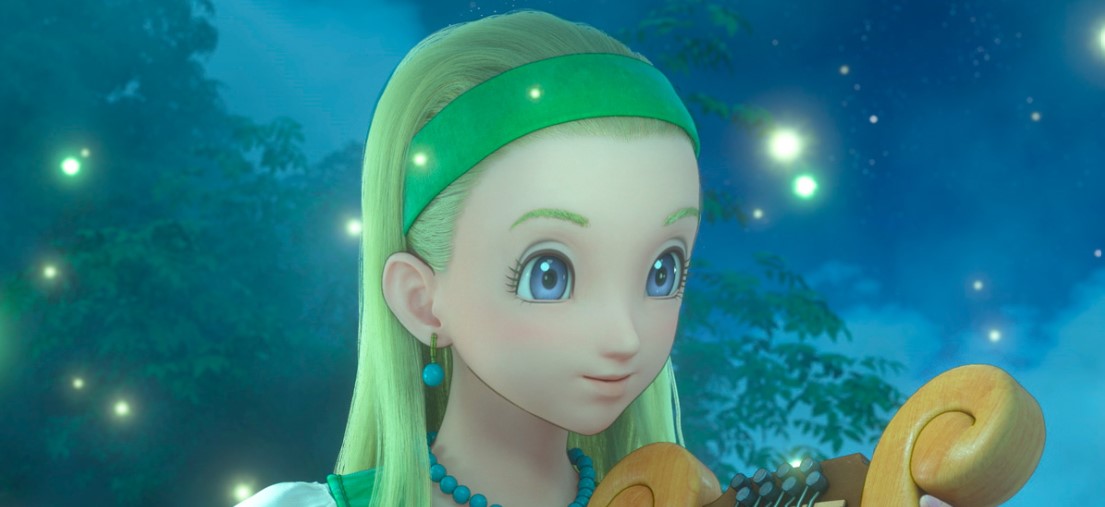Dragon Quest XI S: Echoes of an Elusive Age – Definitive Edition
Let me start from the end. The main problem of Dragon Quest XI crept up from a largely unexpected side: the English translation of the game turned out to be not a localization, but a mediocre adaptation.
Dragon Quest has always had a child-friendly visual style, and the people responsible for the game in the Western branch of Square Enix built the translation clearly appealing to their perceived target audience. As a result, the locations have been renamed to slightly more euphonious ones, almost all the characters have lost their original names, and their speech is now filled with harsh slang, which can be used only by a diligent boy from the church choir, trying to seem cool (and achieving exactly the opposite effect). But the logic behind many of the changes is strange. One can understand the transformation of Kamyu into Eric – too complicated a name for an unaccustomed ear. But why instead of a completely normal Martigny – Jade? Why is Rab better than Row? And why Gemma instead of Emma? You can understand the change of frankly Japanese names, but why touch those close to Western ones?
Of course, with the localization of many Japanese games, all sorts of problems often arise. It happens that puns and references can fly past an uninitiated audience, therefore it is logical to change them to understand analogies. Characters are often renamed for fear of licensing problems (as in Tales of Berseria, the girl Moana was renamed Kamoana so that the heartless Mouse would not knock on the head with a keyword). Even more often there is a battle over the banal censorship of content, usually starting because of the hypocrisy of the localization team.
Dragon Quest XI S is somewhat lucky in this regard.
The game has retained more revealing elements of equipment, and outfits-skins, and dubious combat sexy moves, and, most importantly, bang-bang has not gone anywhere. But at the same time, the game presents to the public a level of adaptation that is comparable to mid-nineties anime translations from the already legendary studio 4kids. When the TV series had their teeth pulled out, they destroyed all hints of roots from the Land of the Rising Sun, they chewed the result and put the resulting porridge in the mouth of the unreasonable public. But Dragon Quest XI does not deserve such an attitude, because even in its adapted form it is one of the most exciting jRPGs of recent years.
As already mentioned, visually it has a bright and even cute style, donated to the series by Akira Toriyama, the author of the popular Dragon Ball franchise. But under a beautiful wrapper, the setting is hidden, in which villainy, murder, kidnapping, and betrayal flourish. Dragon Quest XI manages to uniquely balance outward brilliance with rather gloomy ins and outs, adding dimension to an already imposing world. The lands of Erdrea are striking in size, diversity and detail, an abundance of towns and villages with their own stories. The local world is simply interesting to explore, and even without looking back at the plot, which here, although interesting in itself, seems more like a frame for numerous personal stories of characters: whether it is the Hero himself, who is destined to fight evil, his companions or ordinary inhabitants of Andrea.
But if the world, plot and characters are clearly the driving force behind Dragon Quest, captivating the player, then the gameplay itself sometimes turns into an exercise in frustration. And it’s actually not always a disadvantage.
Dragon Quest XI almost never plays along with either the player or opponents. And almost all gameplay mechanics are available to both sides in battle. The most striking example is the pep system. After receiving or dealing a certain amount of damage, the character can go into a state of super saiyanbuffs that allow you to perform combined moves with allies, which are very different depending on the composition of the squad. Similarly, the designated mode can be turned on by all opponents. And if ordinary enemies almost never have time to reach the gain, then in battles with bosses this is quite a normal phenomenon, usually symbolizing that a fluffy beast with soft fur will soon come to the player.
But at the same time, all opponents (including bosses) are most vulnerable to the same status attacks as the players. No one bothers them and poison, and lull, and intoxicate. If you’re lucky. One can only welcome such equality between the player and the average monster or even bosses. Yes, a lot depends on the parameters of the enemy (which we do not see) and luck (to a large extent). But there’s a chance and often it allows you to fill up a particularly strong enemy without the need for a stubborn and long grind of small mobs. True, this “often” is preceded by hours of repeated walking to the boss’s lair from the nearest safe point. Because let the player be on equal terms with enemies in terms of statuses, this does not mean that the battles will go on at the same level.
At the same time, artificial intelligence cannot be called directly superintelligent. Enemies work according to a relatively simple algorithm: try to hit harder and focus on an opponent with less health. This leads to the fact that even when the opponent does not have enough mana, he may try again and again to carry out a special attack instead of a simple one. And with ordinary mobs, it’s even funny. With bosses, it’s just like an exercise in frustration, when a particularly fat infection with a bottomless mana pool has two attacks that can paralyze the entire squad for three moves, and starts spamming them one by one along with an AOE attack.
But this “frustration” does not push away from the game, but develops healthy anger and motivation to overpower the enemy. More successful squad management (whose composition, fortunately, can be changed right in battle without losing a turn), whether with the best set of equipment, or with a stubborn grind … The latter is a little easier because there are three loading options after death: triggered at the beginning of the map, losing experience and items found; you can return to the nearest city; or you can resurrect at a save point (in front of a priest or statues for prayers), losing half of the cash, but leaving everything else. And given that money is easy to accumulate and can be stored in a bank, the latter option is often the most effective. If these priests and statues hadn’t chatted for half an hour, it would have been great.
But in general, Dragon Quest XI does not bring anything radically new to the gameplay. Doesn’t take obvious risks. It’s just a solid turn based jRPG. A game that is confident in its roots and firmly knows what they want from it: a good story with bright characters and a system of turn-based battles proven over the years, which works great as an entry point into the series for neophytes. It has enough new stuff to entice new players without offending old fans of the series. But really, why do something radically new when you can just bring the proven old to a state close to ideal?







